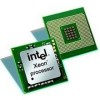Intel X5472 Specification Update - Page 31
Update of Read/Write R/W or User/Supervisor U/S or Present P
 |
UPC - 735858201551
View all Intel X5472 manuals
Add to My Manuals
Save this manual to your list of manuals |
Page 31 highlights
AX45. Partial Streaming Load Instruction Sequence May Cause the Processor to Hang Problem: Under some rare conditions, when multiple streaming load instructions (MOVNTDQA) are mixed with non-streaming loads that split across cache lines, the processor may hang. Implication: Under the scenario described above, the processor may hang. Intel has not observed this erratum with any commercially available software. Workaround: It is possible for the BIOS to contain a workaround for this erratum. However, streaming behavior may be re-enabled by setting bit 5 to 1 of the MSR at address 0x21 for software development or testing purposes. If this bit is changed, then a readmodify-write should be performed to preserve other bits of this MSR. When the streaming behavior is enabled and using streaming load instructions, always consume a full cache line worth of data and/or avoid mixing them with non-streaming memory references. If streaming loads are used to read partial cache lines, and mixed with nonstreaming memory references, use fences to isolate the streaming load operations from non-streaming memory operations. Status: For the steppings affected, see the Summary Tables of Changes. AX46. Self/Cross Modifying Code May Not be Detected or May Cause a Machine Check Exception Problem: If instructions from at least three different ways in the same instruction cache set exist in the pipeline combined with some rare internal state, self-modifying code (SMC) or cross-modifying code may not be detected and/or handled. Implication: An instruction that should be overwritten by another instruction while in the processor pipeline may not be detected/modified, and could retire without detection. Alternatively the instruction may cause a Machine Check Exception. Intel has not observed this erratum with any commercially available software. Workaround: It is possible for the BIOS to contain a workaround for this erratum. Status: For the steppings affected, see the Summary Tables of Changes. AX47. Data TLB Eviction Condition in the Middle of a Cacheline Split Load Operation May Cause the Processor to Hang Problem: If the TLB translation gets evicted while completing a cacheline split load operation, under rare scenarios the processor may hang. Implication: The cacheline split load operation may not be able to complete normally, and the machine may hang and generate Machine Check Exception. Intel has not observed this erratum with any commercially available software. Workaround: It is possible for the BIOS to contain a workaround for this erratum. Status: For the steppings affected, see the Summary Tables of Changes. AX48. Problem: Update of Read/Write (R/W) or User/Supervisor (U/S) or Present (P) Bits without TLB Shootdown May Cause Unexpected Processor Behavior Updating a page table entry by changing R/W, U/S or P bits, even when transitioning these bits from 0 to 1, without keeping the affected linear address range coherent with all TLB (Translation Lookaside Buffers) and paging-structures caches in the processor, in conjunction with a complex sequence of internal processor micro-architectural events and store operations, may lead to unexpected processor behavior. 31 Intel® Xeon® Processor 5400 Series Specification Update















